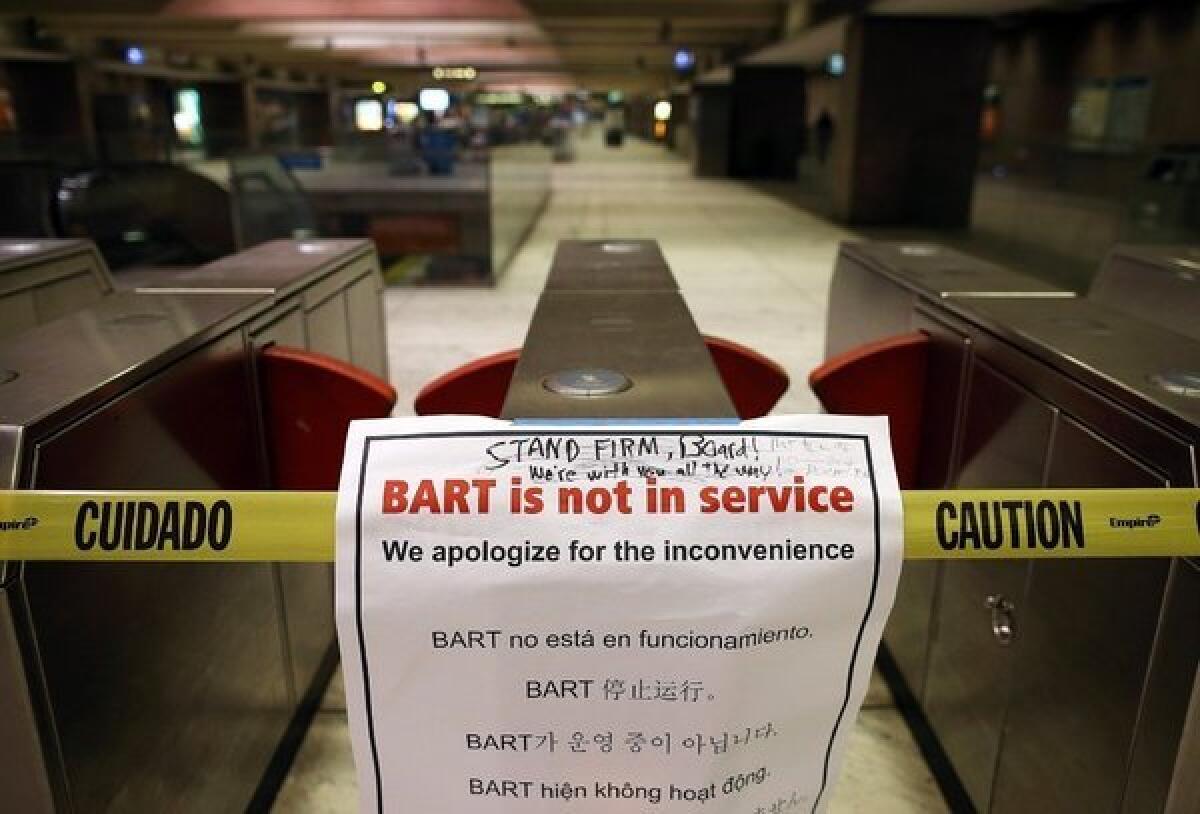The BART strike brings out class ugliness in Silicon Valley

- Share via
Silicon Valley’s technology elite haven’t done too well at masquerading as salt-of-the-earth types lately, what with allegedly despoiling redwood groves with multimillion-dollar weddings and such.
But it takes just a hint of physical inconvenience to bring out the nastier features of the class war developing between tech industry types and the people they prefer to think of as the grateful beneficiaries of their brilliant smartphone apps. The inconvenience of a transit strike, for instance.
A strike that has stopped all service on BART, the Bay Area Rapid Transit subway line serving San Francisco and surrounding communities, is now in its fourth day, with no talks in the offing. [Update: Talks with a federal mediator will resume Monday.] It’s a replay of a strike this summer that ended when Gov. Jerry Brown imposed a cooling-off period. Talks broke off last week, and on Friday 2,400 unionized drivers and other employees walked.
Is the tech industry sympathetic? Not too much. On Friday, Twitter executive Ben Grossman tweeted as follows:
“What’s brown and black and looks great on someone involved in causing the #bartstrike?
“A Doberman.”
To his credit, sorta, Grossman quickly deleted the tweet, attributing his indiscretion to “bundled up road rage” and fatigue. But not before it was spotted by Valleywag, a site that gets great pleasure in spotting exactly such things.
The current strike hasn’t lasted long enough to inspire many more such outbursts, although TechCrunch, an organ for high-tech investors, asked why BART shouldn’t simply automate its system and thereby just do away with troublesome union members. Who would be left to buy Silicon Valley’s products it didn’t say.
July’s strike, which lasted five days, produced more us-versus-them ugliness. “If I had more friends who were BART drivers, I would probably be very sympathetic to their cause, and if they had more friends who were building companies they would probably realize we’re not all millionaires,” Sarah Lacy, whose PandoDaily website serves as a publicity machine for Bay Area start-ups, stated on the radio program “Marketplace Money.” “We’re actually working pretty hard to build something.”
Critics of the striking workers observe that their average base pay is $60,000, which sounds high but won’t get you very far in a Bay Area, where housing prices have been driven sky high by, yes, the tech industry. Some tech writers observe that the two striking unions are resisting the rollout of technology, which makes the workers sound like Luddites. In fact, technology is a side issue; what really divides labor and management is money -- the workers haven’t had a raise in five years -- and the question of how much employees should pay for healthcare and retirement benefits.
When the tech press bemoans the inconvenience caused by the strike, they seem to forget that a strike is supposed to cause inconvenience; that’s what puts pressure on management to come back to the table.
Blaming the workers for the impasse is a peculiarly one-sided interpretation of what’s happening. Sure, you could say that 2,400 non-automated, human employees stand in the way of Silicon Valley’s determination to “build something.” But it’s equally true to say that BART’s nine board members and its general manager are the real obstacles to a settlement. Maybe Silicon Valley should figure out a way to automate them.







